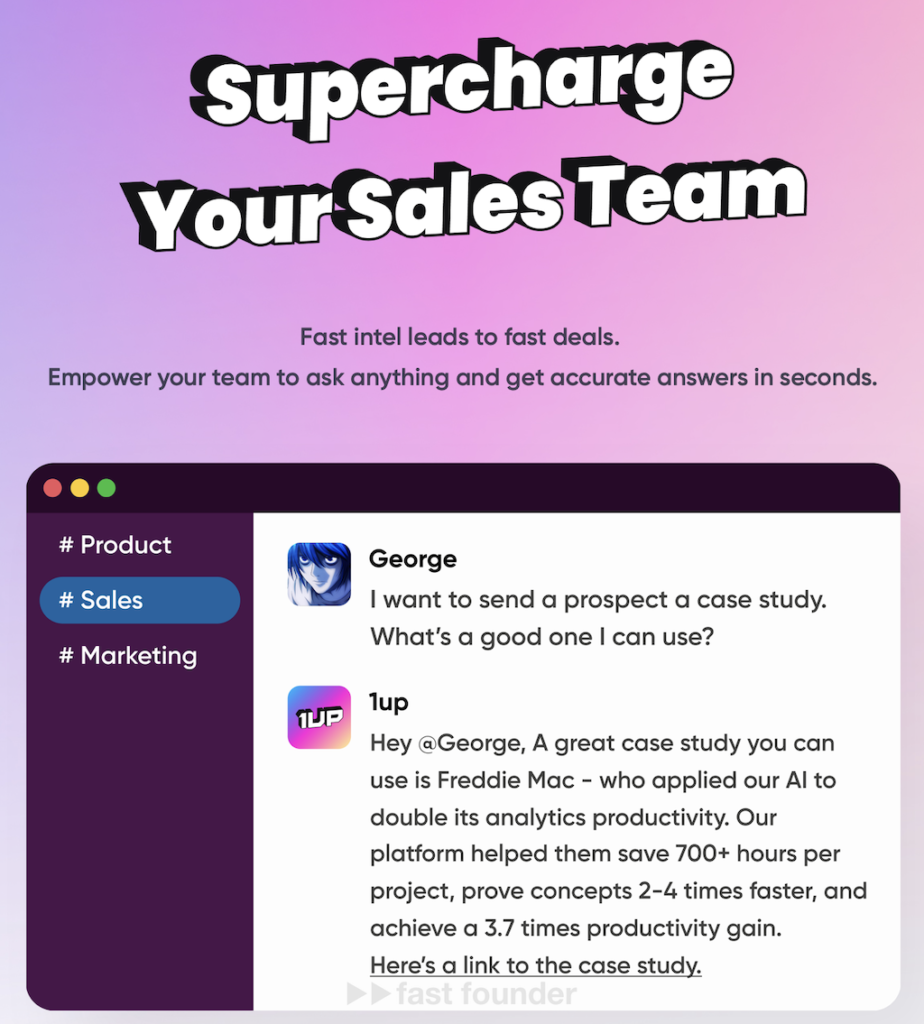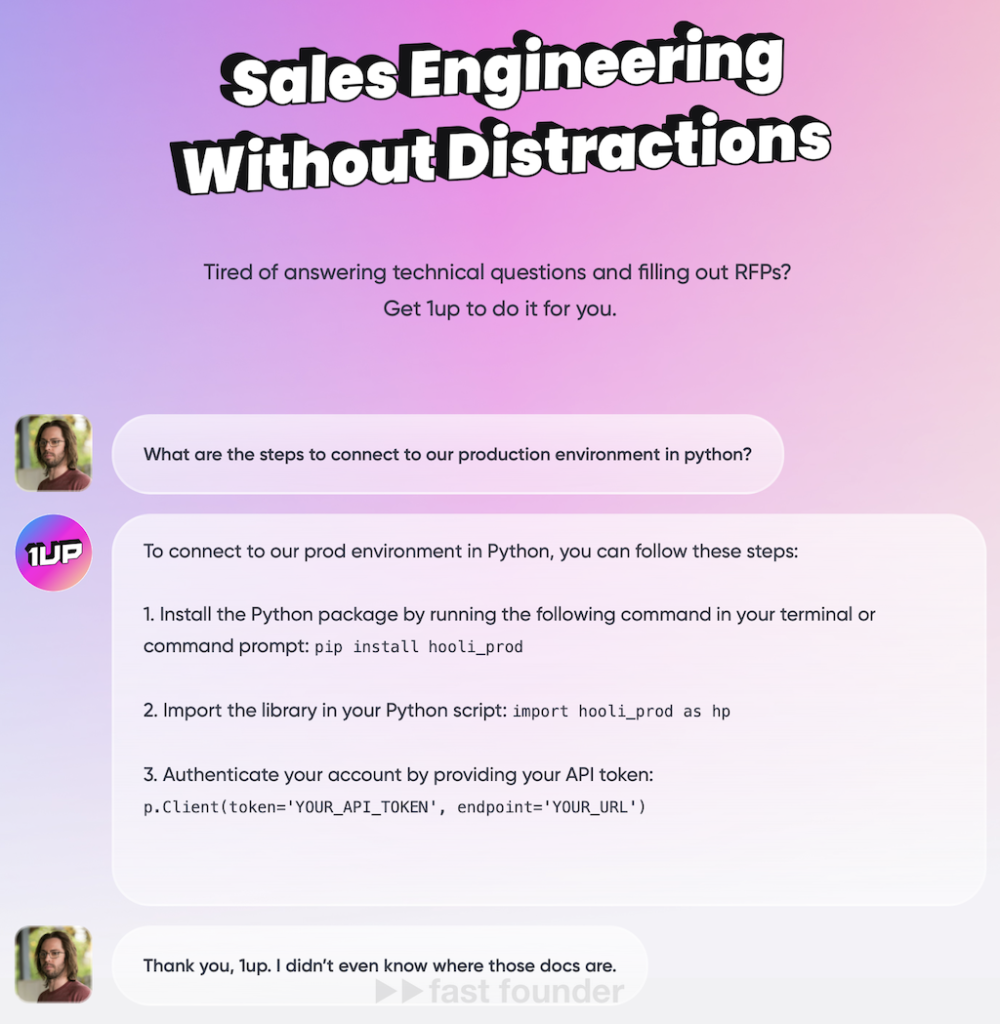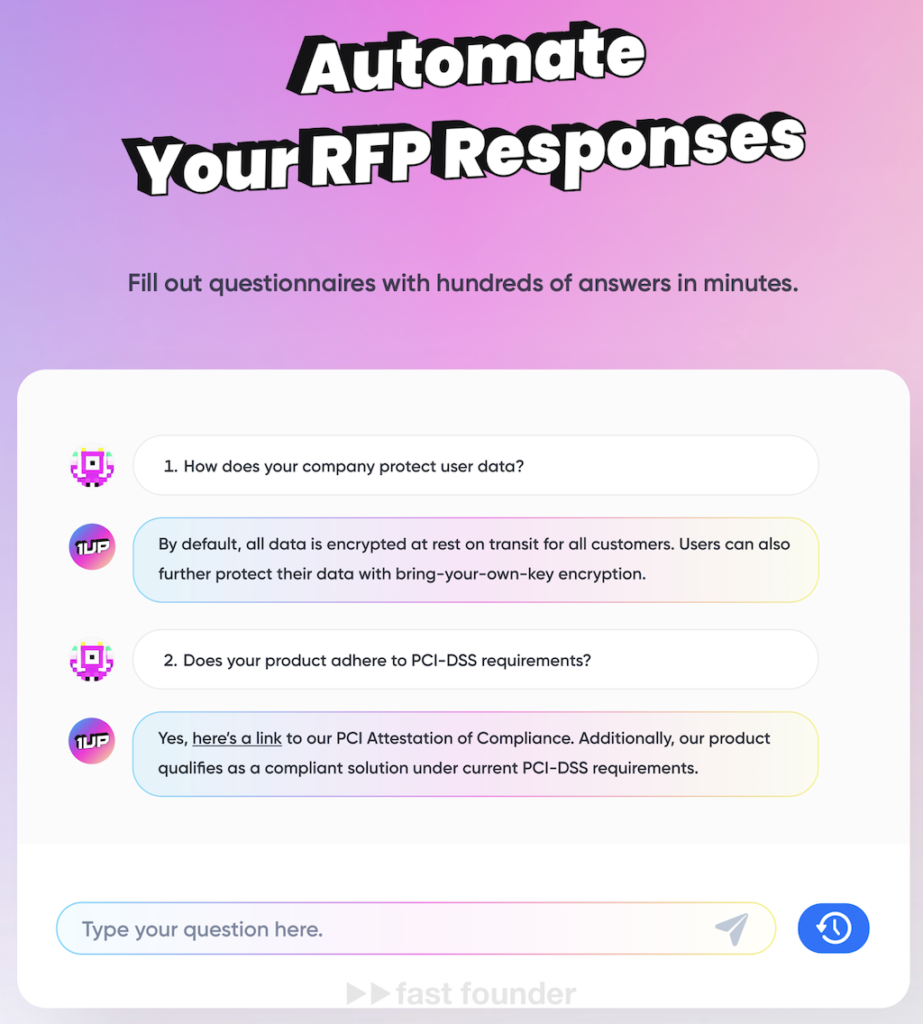The turnover in companies continues to grow. At the very least, this has led to an increased demand for platforms designed to retain employees. But that’s not all! Companies have also begun to need corporate knowledge bases, which can be used to transfer knowledge to new employees. However, to successfully sell these databases, one must remember the magic word – ‘specialization’. And the essence of the magic is as follows.
The Essence of the Project
Salespeople dealing with B2B deals often face intricate questions from clients about the product they are selling. Then, they start looking for people within their company who can answer these questions—to relay the responses back to the clients.

1up has created an AI assistant that helps salespeople get answers to their questions 10 times faster than the traditional method—digging through documentation or waiting for responses from colleagues.
The quicker a salesperson responds to client questions, the faster a deal can be closed. This also prevents creating an impression among clients that “the salespeople are clueless, and their product is nonsensical if nobody can promptly answer my questions.”
1up’s AI assistant can handle quite complex queries.

For instance, “I need to send a potential buyer a business case description where our product helped a client solve their issue”—to which 1up will provide a link to the business case description and a brief summary of the results achieved by the client.

Or, “What are the three most important reasons that made other clients use our product, which I can cite to a potential buyer?”

Or even more complex questions like, “How can a client connect to our product using an API call from a Python program?”

To find answers, 1up’s AI assistant needs to be connected to internal information sources. In the simplest case, these could be cloud storage like Google Drive, where product presentations, business case descriptions, customer objection responses, product documentation, and other useful documents are stored.

Salespeople can ask the AI assistant questions and receive answers directly in the messenger they usually use—Slack, Microsoft Teams, or Google Chat.

Another task that 1up helps automate is filling out surveys and questionnaires about products, which large companies typically distribute during the initial phase of collecting offers from suppliers.
These questions are often tedious—“How does your product protect user data?”, “Does your product comply with PCI-DSS requirements?” and so on. But these questions need quick and comprehensive answers to move to the next stage of more substantive negotiations about a potential deal.

Since such surveys contain many questions, the entire survey can be uploaded to the 1up platform and instantly returned filled out—saving time from transmitting each question separately to the AI assistant.

1up also has another important skill, useful not only for salespeople but also for product managers and marketers—the AI assistant can answer questions not only about the company’s products but also about competitors’ products!
It draws answers to these questions from external sources—competitors’ websites, Youtube, Reddit, LinkedIn, Google search, and so on.

Questions about competitors’ products can be straightforward—“Does product X have this particular feature, and how to use it?”. Or more complex—“How do users rate our product compared to the competitor?”, “Why do customers like the competing product?”

The cost of using 1up ranges from $249 per month for 5 users with significant limitations on the number of information sources to $849 per month for 50 users with more, but still quite limited, sources. A more powerful version of the platform will cost even more, but for pricing on such a configuration, you need to contact the startup directly.
1up has now raised its first investment of $2.5 million.
What’s Interesting
Perhaps someday AI salespeople will be able to completely replace human salespeople. But until this happens—especially when it comes to relatively expensive deals—this is not the case.
After all, sales are not just a mechanical process of providing answers to questions. It’s about live communication, establishing contact, showing empathy, and other human emotions. But you can’t sell solely on emotions either; you also need to be able to answer questions about the product quickly, fully, and convincingly.
However, not every salesperson is a full-fledged product expert capable of answering any client questions.

This problem is exacerbated by the fact that turnover among salespeople is around 35% per year, three times higher than the ideal level of turnover in companies for any other position. As a result, salespeople in companies change so rapidly that they don’t have time to fully master all the knowledge necessary for successful product sales.

It’s believed that one becomes a full-fledged salesperson only in the second or third year of selling a product. But the average tenure of a salesperson at a company is now just 18 months, and this time continues to shorten 🙁
Thus, a system of crutches and supports in the form of an AI assistant, helping salespeople answer factual questions about the product and its competitors, can be considered not just a good wish but a harsh necessity.
Incidentally, from a technological standpoint, today’s 1up platform can be called a “standard” corporate knowledge base. Especially since more and more corporate knowledge bases are now being converted to AI technologies and supplemented with AI assistants.
However, selling corporate knowledge bases isn’t easy. Companies must be convinced of the “necessity of creating a centralized source of information,” which “can be used by different categories of employees” and other such blah-blah-blah.
In other words, a corporate knowledge base is for everyone and about everything. That is, for no one in particular 😉 Therefore, no specific department or division feels a strong enough need to lobby for the purchase of such a product at the company level or to make it out of their own budget.
Therefore, 1up’s approach of essentially turning a corporate knowledge base into a specific product for sales departments is a very good move, allowing for the identification of a specific group of people (sales department heads) interested in purchasing such a product solely to improve the performance of their division.
Where to Run
The growing turnover of qualified employees in companies is a reason for the increasing demand for corporate knowledge bases, which can be used to transfer knowledge to new employees. The implementation of AI technologies allows these knowledge bases to become even smarter and more convenient.
Thus, the field of corporate knowledge bases, in general, is in demand and promising. However, it’s better to sell specific products in this area, targeted at specific categories of employees. To have the opportunity to target specific managers who want to lobby or can independently decide on their purchase. Without this, selling them will continue to be difficult.
Today’s 1up is an example of such targeting.

Another example is the startup Augmend. They created a platform for building knowledge bases for programmers, where programmers can easily upload information about the rules of working with the code they’ve written by recording the screen with voice explanations.
The reason for the demand for such a knowledge base for programmers is the same—the average tenure of programmers at a company is now the same 18 months (1-2 years). This startup raised $2.2 million in its first investment round.
Thus, the direction of movement is the creation of corporate knowledge bases using AI technologies. But crucially—for preserving and transferring knowledge among specific categories of employees, where there are high risks from the loss and/or absence of knowledge.
Moreover, being tailored to specific categories of employees allows adding specific tools to such platforms, allowing the accumulation of corresponding knowledge in simple ways—such as the tool for recording screen and voice at Augmend, coupled with a tool for analyzing and uploading the created videos to the knowledge base.
And which category of employees would you like to target? What specific tools for easier knowledge accumulation can you offer for this category of employees?
About the Company
1up
Website: 1up.ai
Last Round: $2.5M, November 1, 2023
Total Investments: $2.5M, Rounds: 1
